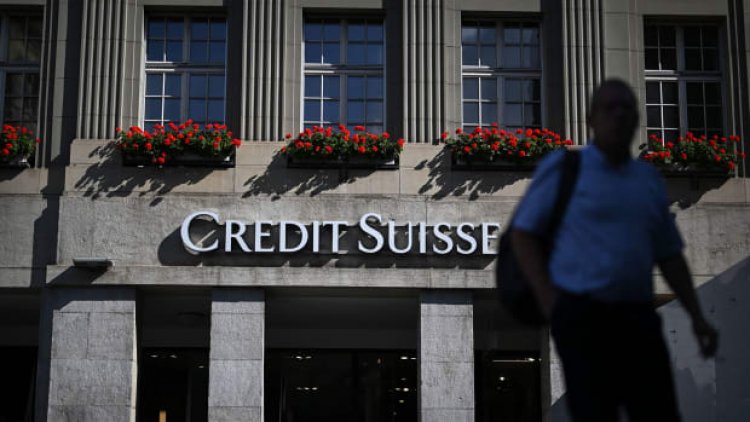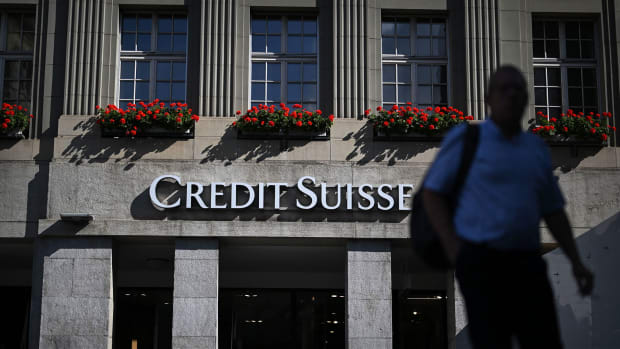Credit Suisse Runs Into New Problems
The ailing bank announced "material weaknesses" and continued cash withdrawals by its customers.

The ailing bank announced "material weaknesses" and continued cash withdrawals by its customers.
Each week has its share of surprises. Such has been the daily life of Credit Suisse for several years now.
The former European banking flagship finally managed to publish its annual report on March 14 after being forced to delay its publication for a few days following a last-minute call from a U.S. regulator.
The Securities and Exchange Commission had asked questions related to what Credit Suisse presents as the "technical assessment” of revisions to cashflow statements going back to 2019.
The No. 2 Swiss bank indicated on March 14 that discussions with the SEC were now over and that they will not result in any consequences for its financial results in any year. All prudential ratios, including capital, leverage, liquidity and funding ratios, are unaffected and remain as they were prior to the SEC call.
As a result, Credit Suisse (CSGKF) confirmed its huge net loss of 7.3 billion Swiss francs ($8 billion) recorded last year. It was its largest annual loss since the 2008 financial crisis, and consequently, the bank decided not to distribute annual bonuses to top executives. FABRICE COFFRINI/AFP via Getty Images
Additional Bad News
The annual document just delivered additional bad news.
Credit Suisse indicates that it has reviewed its financial reporting and has detected "material weaknesses" related to the accounts for the 2021 and 2022 fiscal years.
"Based upon its review and evaluation, the group’s management has concluded that, as of Dec. 31, 2022, the group’s internal control over financial reporting was not effective as it did not design and maintain an effective risk assessment process to identify and analyze the risk of material misstatements in its financial statements," the company said.
It added that "this material weakness could result in misstatements of account balances or disclosures that would result in a material misstatement to the annual financial statements of Credit Suisse (Schweiz) AG that potentially would not be prevented or detected."
The bank said it is developing a "remediation" plan, including strengthening the risk and control framework.
"The Board of Directors of Credit Suisse (Schweiz) AG is closely monitoring the implementation and effectiveness of the remediation," the company assured.
In an email sent to employees, Chief Financial Officer Dixit Joshi, reaffirmed that the questions raised by the SEC have no impact on the 2022 financial results.
"However, we take our controls very seriously and are remediating specific material weaknesses we identified in our front-to-back financial reporting controls to ensure we have a robust framework at all times," the executive wrote in this email reviewed by TheStreet.
Withdrawals Continue
But most worrying is that Credit Suisse has indicated that customers continue to withdraw their money even if at lower levels than last October. This is not good news because it means that the bank's efforts to convince that its emergency plan will turn the company around are not really convincing some of its customers.
"During early fourth quarter of 2022, Credit Suisse began experiencing significantly higher withdrawals of cash deposits as well as non-renewal of maturing time deposits. However, as the quarter progressed, these outflows stabilized to much lower levels but had not yet reversed by year end," the firm said
Net asset outflows represented approximately 2% of assets under management reported as of the end of 2021.
The bank has suffered setback after setback since March 2021 and the bankruptcy of Greensill Capital, a specialized lender with links to former U.K. Prime Minister David Cameron.
The British company, which was founded in 2011 by the financier Lex Greensill, was a supply chain and accounts receivables lender, that specializes in lending money to companies so that they can pay their suppliers. It then packaging the debts of these companies into financial securities, which it resold to investors.
The house of cards began to crumble when these investors, including Credit Suisse, had doubts about the real value of the debts and abandoned Greensill, which then filed for bankruptcy in March 2021.
Credit Suisse invested $10 billion of its clients' capital in Greensill products.
This bankruptcy marked the beginning of a series of scandals that tarnished Credit Suisse's reputation and weakened it.
Last month, the Swiss Financial Market Supervisory Authority FINMA said that Credit Suisse "seriously breached its supervisory duty to adequately identify, limit and monitor risks in the context of the business relationship with Lex Greensill over a period of years."
The company is due to hold its Shareholder meeting on April 4 in Zurich. This will be the first in-person meeting for shareholders since the covid-19 pandemic.
Credit Suisse lost its former largest shareholder this month, as Harris Associates liquidated what was left of its stake after first investing in the bank 20 years ago.
Sign up for Real Money Pro to learn the ins and outs of the trading floor from Doug Kass’s Daily Diary.
What's Your Reaction?



























































